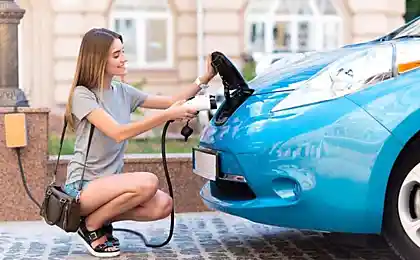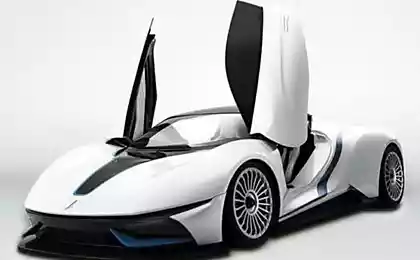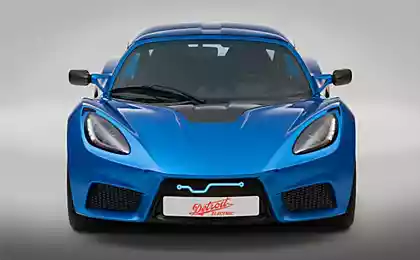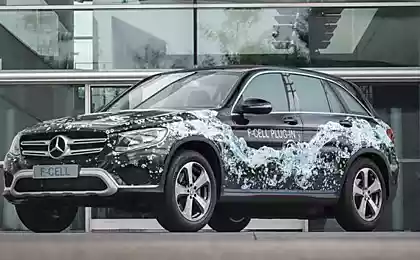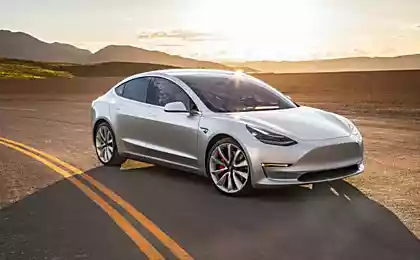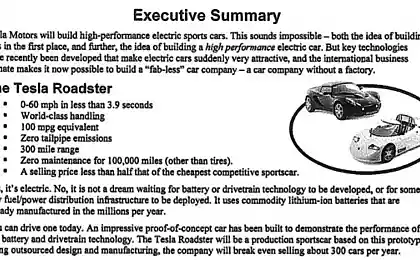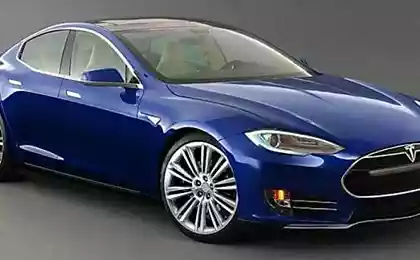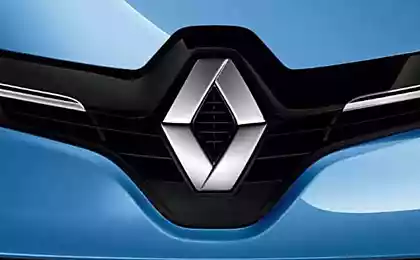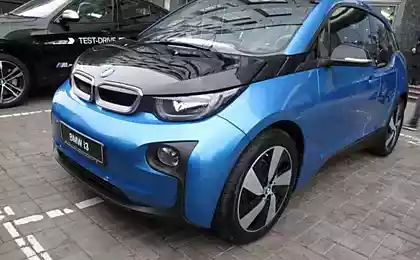474
Oil giants admitted: electric boom – a factor that will have to be considered
Electric vehicles (Electric Vehicles, EV) quickly and confidently come. And it is not just the opinion of the public – Total SA, one of the world's largest oil producers, says that by the end of the next decade the share of EV in new car sales may exceed 30%.
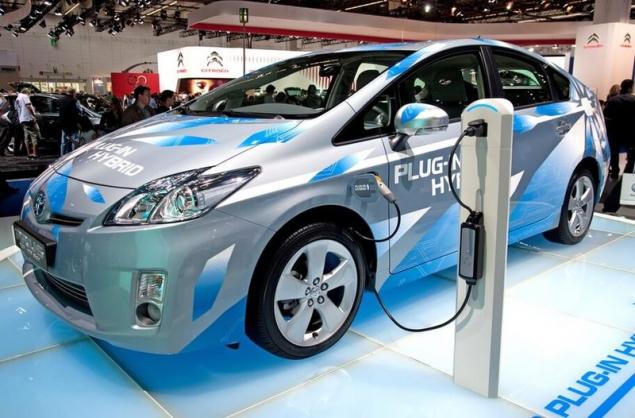
The increase in the fleet of electric vehicles will reduce demand for hydrocarbon fuels in 2030, said the chief economist Total energy Joel Kusa at the conference Bloomberg New Energy Finance (BNEF). "By 2030, the share of EV will be 15-30% of sales of new vehicles, then fuel demand will flatten or even fall," – said the expert.
This top Manager Total prediction is the most aggressive among the suggestions voiced by analysts of the leading oil companies. It exceeds its own forecast BNEF, said Colin Mckerracher, head of transport analysis, Bloomberg New Energy Finance.
"That's great! said Mckerracher. – This is definitely the most aggressive forecast announced by the majors".Other oil companies reducing their long-term forecasts on the demand for oil. So, Ben van Beurden chief Executive officer Royal Dutch Shell Plc said in March that oil demand may reach a peak in the late 2020s. He has created a new business unit to identify those areas of activity where the introduction of "clean" technologies may be the most profitable for the company.
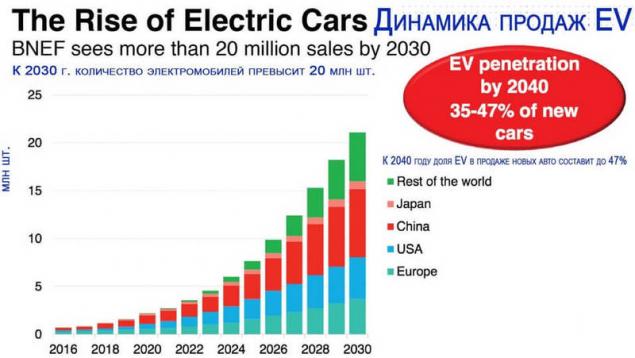
Electric cars begin to compete with gasoline counterparts, both in price and in characteristics. According to estimates BNEF, the most expensive part of an EV is the battery, the cost of which can amount to 50% of the total cost of the machine. The first electric car that could compete with traditional cars in its class is its premium sedan Tesla Model S. Today, it is one of the best selling vehicles in the United States.
But the technology improved and the price of the battery is reduced by about 20% per year. While automakers spend billions [of dollars] to electrify its range. For example, Volkswagen AG has set itself the target that by 2025, the volume of sales of electric vehicles to 25%. Toyota Motor Corp. plans to completely abandon diesel and petrol powertrains by 2050.
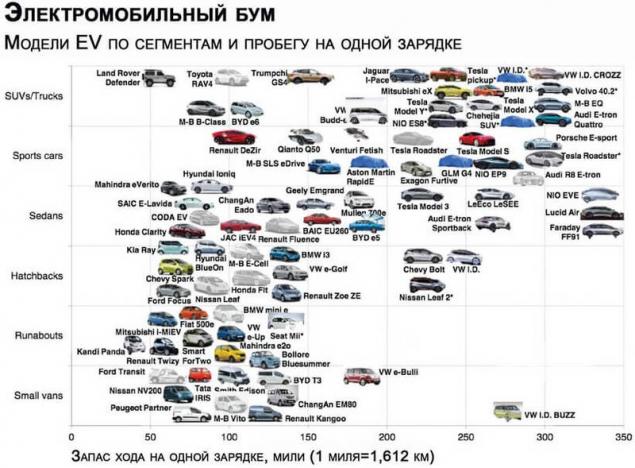
Currently EV are about 1% of global auto sales, but automakers are getting ready to change the situation. So, in 2018, Volkswagen will be released on the American market with electrocreaser Audi and will participate in the deployment of new high-speed charging network, which aims to compete with the stations Tesla Supercharger. To enter the EV market preparing Jaguar, Volvo, Mercedes-Benz, VW, General Motors, etc.
"By 2020, in different classes will be offered more than 120 different models of EV," said Michael Liebreich, founder of Bloomberg New Energy Finance. Is a great machine. On their background are equipped with internal combustion engines equivalents model will look old fashion."published
P. S. And remember, only by changing their consumption — together we change the world! ©
Source: //ecotechnica.com.ua/transport/2368-neftyanye-giganty-priznali-elektromobilnyj-bum-faktor-s-kotorym-pridetsya-schitatsya.html

The increase in the fleet of electric vehicles will reduce demand for hydrocarbon fuels in 2030, said the chief economist Total energy Joel Kusa at the conference Bloomberg New Energy Finance (BNEF). "By 2030, the share of EV will be 15-30% of sales of new vehicles, then fuel demand will flatten or even fall," – said the expert.
This top Manager Total prediction is the most aggressive among the suggestions voiced by analysts of the leading oil companies. It exceeds its own forecast BNEF, said Colin Mckerracher, head of transport analysis, Bloomberg New Energy Finance.
"That's great! said Mckerracher. – This is definitely the most aggressive forecast announced by the majors".Other oil companies reducing their long-term forecasts on the demand for oil. So, Ben van Beurden chief Executive officer Royal Dutch Shell Plc said in March that oil demand may reach a peak in the late 2020s. He has created a new business unit to identify those areas of activity where the introduction of "clean" technologies may be the most profitable for the company.

Electric cars begin to compete with gasoline counterparts, both in price and in characteristics. According to estimates BNEF, the most expensive part of an EV is the battery, the cost of which can amount to 50% of the total cost of the machine. The first electric car that could compete with traditional cars in its class is its premium sedan Tesla Model S. Today, it is one of the best selling vehicles in the United States.
But the technology improved and the price of the battery is reduced by about 20% per year. While automakers spend billions [of dollars] to electrify its range. For example, Volkswagen AG has set itself the target that by 2025, the volume of sales of electric vehicles to 25%. Toyota Motor Corp. plans to completely abandon diesel and petrol powertrains by 2050.

Currently EV are about 1% of global auto sales, but automakers are getting ready to change the situation. So, in 2018, Volkswagen will be released on the American market with electrocreaser Audi and will participate in the deployment of new high-speed charging network, which aims to compete with the stations Tesla Supercharger. To enter the EV market preparing Jaguar, Volvo, Mercedes-Benz, VW, General Motors, etc.
"By 2020, in different classes will be offered more than 120 different models of EV," said Michael Liebreich, founder of Bloomberg New Energy Finance. Is a great machine. On their background are equipped with internal combustion engines equivalents model will look old fashion."published
P. S. And remember, only by changing their consumption — together we change the world! ©
Source: //ecotechnica.com.ua/transport/2368-neftyanye-giganty-priznali-elektromobilnyj-bum-faktor-s-kotorym-pridetsya-schitatsya.html
"Taught, but have forgotten": misguided and true knowledge
Excessive parental care: an Important key to finding the "Golden mean"
